-
AMD-based rack server for HPC and AI workloads
ASUS RS700A-E13-RS12U is an efficient, versatile server powered by dual AMD EPYC™ 9005-series processors, delivering exceptional performance for demanding enterprise workloads. Built on the advanced 3nm Zen5/5c architecture, these processors offer up to 192 cores, 384 threads and clock speeds of up to 5GHz, making them ideal for AI/ML processing, data analytics and virtualization. RS700A-E13-RS12U is optimized for seamless integration in modern data centers, offering high efficiency and compatibility across diverse IT environments.
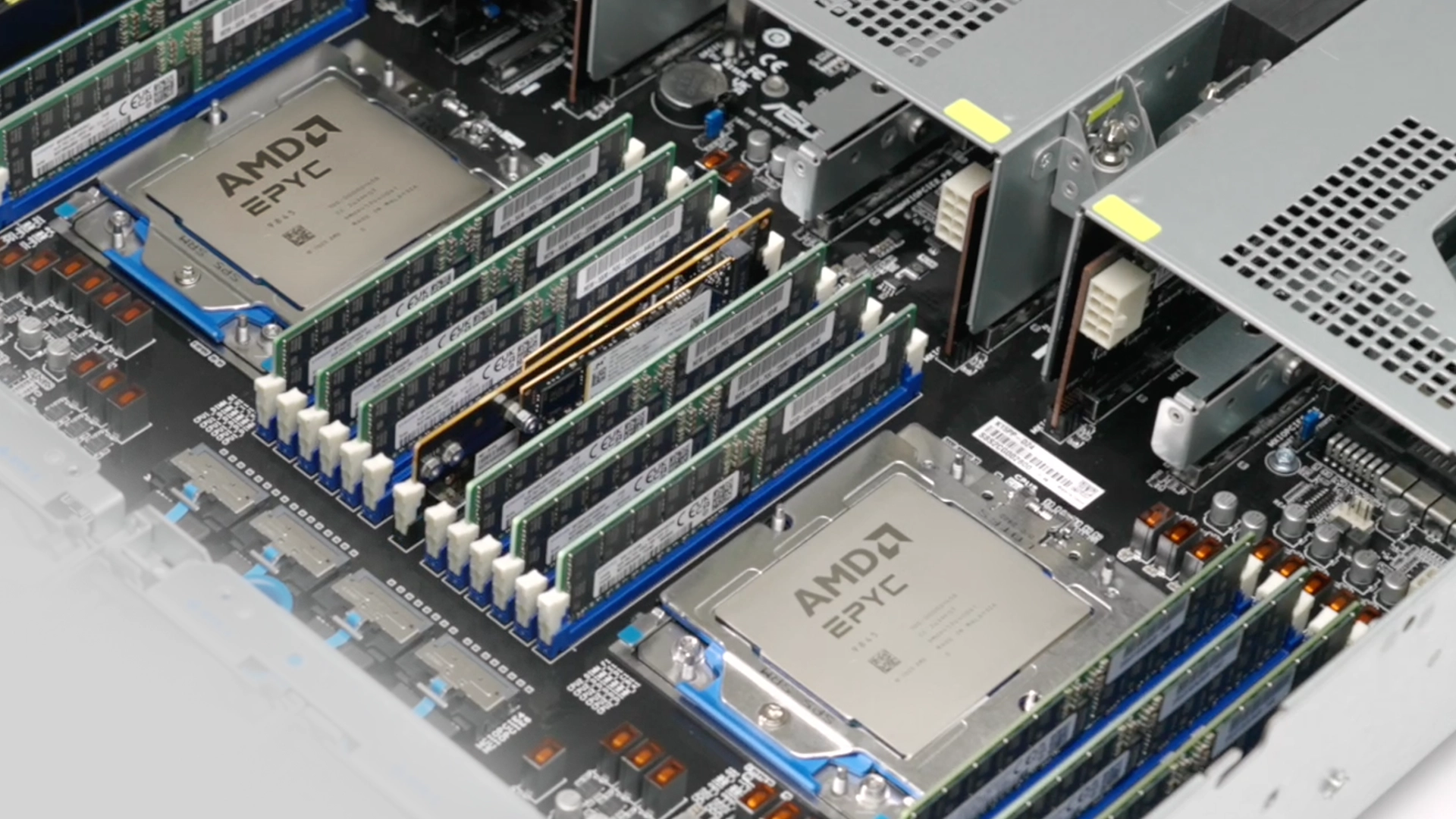
-
Flexible and expandable server for multi-tasking
With the advanced x86 architecture and high CPU density, RS700A-E13-RS12U enhances computing efficiency and integrates seamlessly into existing data center infrastructures. This versatile server is designed for scalability, offering up to 3TB of memory and supporting various types of cards, including networking, RAID for flexible storage configurations. Its 80® PLUS Titanium redundant power supplies ensure optimal energy efficiency, reducing operational costs.
-
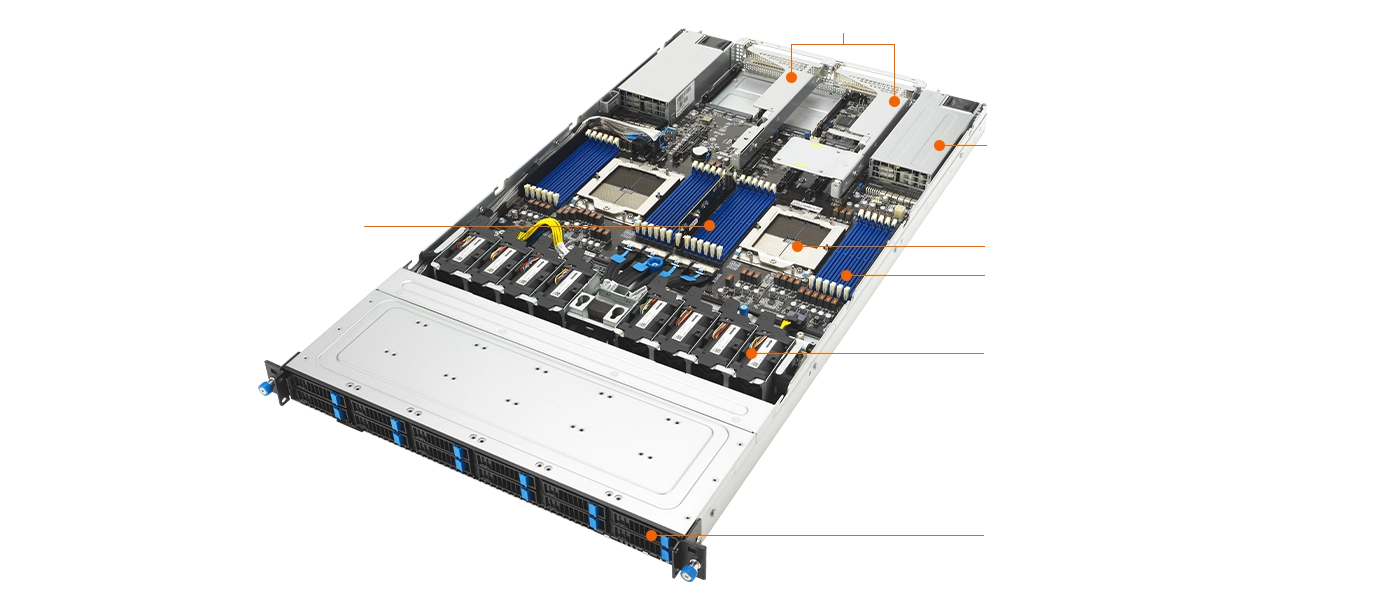
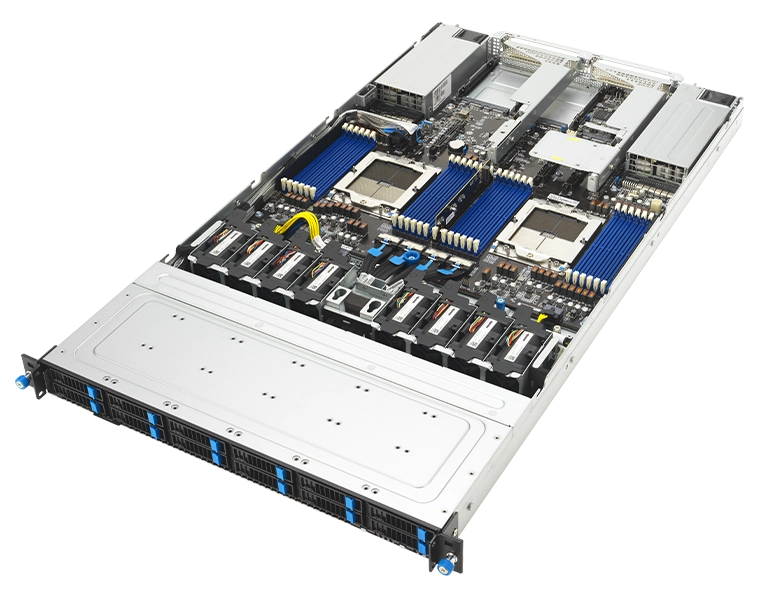 1 1 2 3 4 5 6 7
1 1 2 3 4 5 6 714 x Expansion slots (2 PCIe + 2 OCP3.0)
22 x DIMM.2 (Up to 22110)
31+1 2000W 80 PLUS Titanium/Platinum PSU
4Dual AMD Turin CPU (TDP: 400W)
524 x DDR5 DIMMs (1DPC)
68 x 4056 Tool-less hot-swappable Fan Module
712 x 2.5” Hot-swap drive bays
-
-

 1
11[Bay 1-12] NVMe
Config#1: 12 NVMe

 1
11[Bay 1-4] SATA/SAS* [Bay 5-12] NVMe/SATA/SAS*
Config#2: 8 NVMe + 4 NVMe/SATA/SAS*
*SAS support only from optional SAS HBA/RAID card
-

 1 2 3 4 5 6 7 8 9 10 11
1 2 3 4 5 6 7 8 9 10 111PCIe Gen5 x16 (FHHL)
2OCP3.0 Gen5 x16
3PCIe Gen5 x16 (FHHL)
4OCP3.0 Gen5 x16
5Power switch/LED
6DM LAN port*
72 x USB 5Gbps portsv
8Mini Display Port
9Location switch/LED
10Debug Port
111+1 2000W 80 PLUS Titanium/Platinum PSU
*The DM LAN port is for ASUS ASMB12-iKVM controller only.
-
-
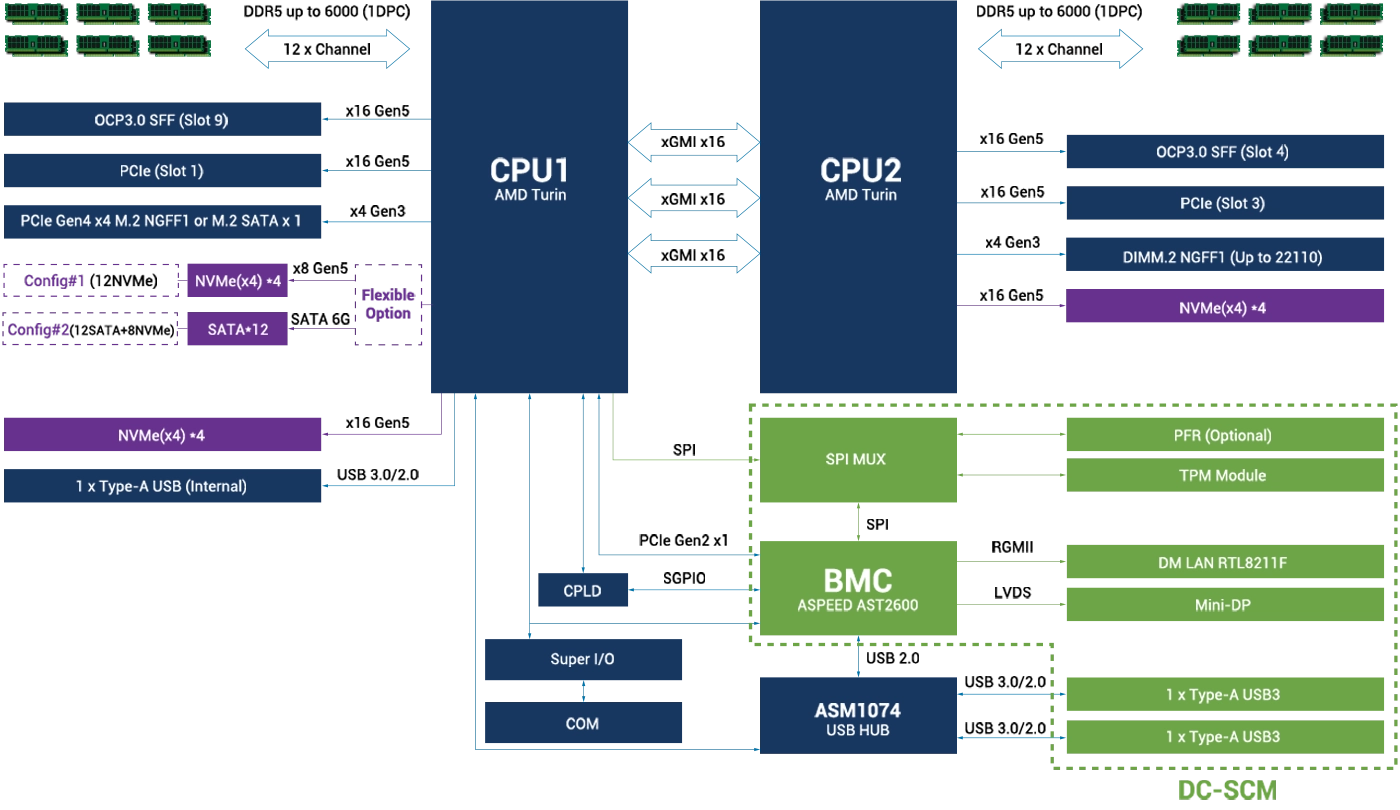
*All storage can support SAS through HBA/RAID card.
-
-
Scalable modular architecture for seamless integration
RS700A-E13-RS12U features a modular DC-MHS architecture that ensures seamless integration and high performance in data center environments. Its scalable design allows businesses to adapt to changing IT workloads by adding or removing modules without disruption. This flexibility improves operational efficiency, simplifies system management and supports phased upgrades. The architecture optimizes capital expenditure and resource use, reducing upfront costs. Additionally, modular components can be replaced or upgraded quickly, minimizing downtime and ensuring continuous operations. The DC-MHS architecture also incorporates advanced cooling and power management systems, improving energy efficiency, reducing operational costs, and supporting sustainability efforts.
-
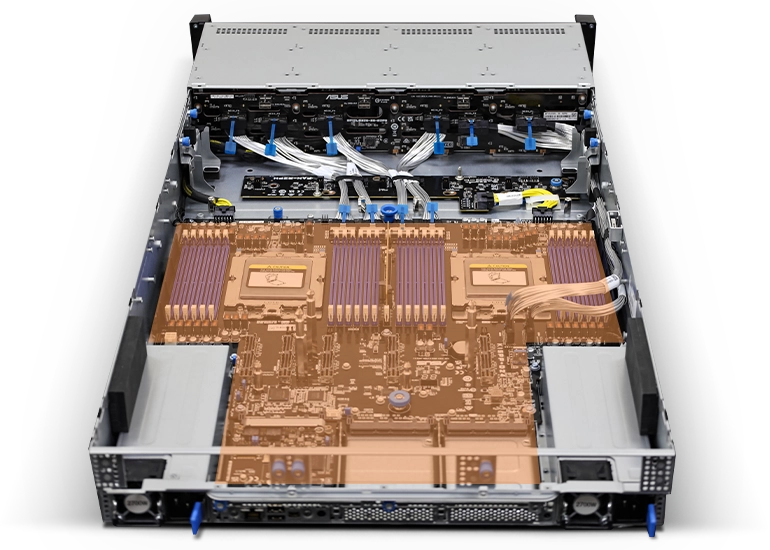
M-FLW (Modular Hardware System Full Width):
Optimizes server utilization for high-performance computing tasks like AI training and big data analytics.
-
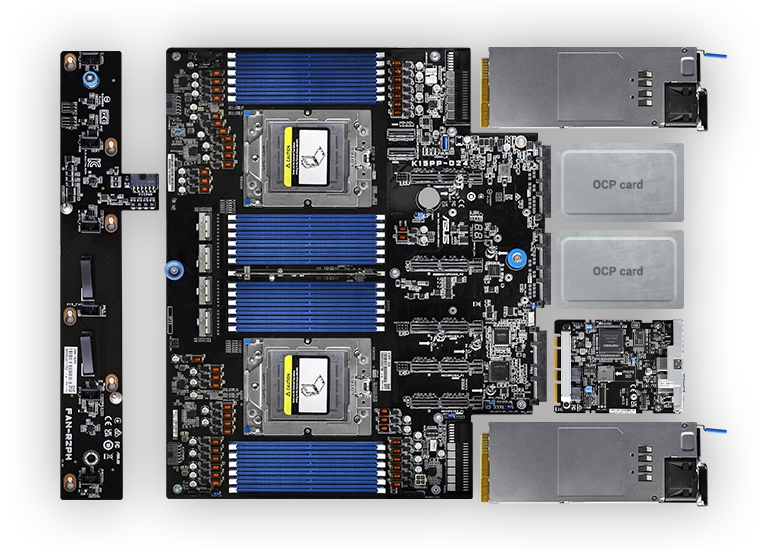
M-PIC (Modular Hardware System Platform Infrastructure Connectivity):
Enables seamless communication and data transfer between different parts of the server, improving overall performance.
-
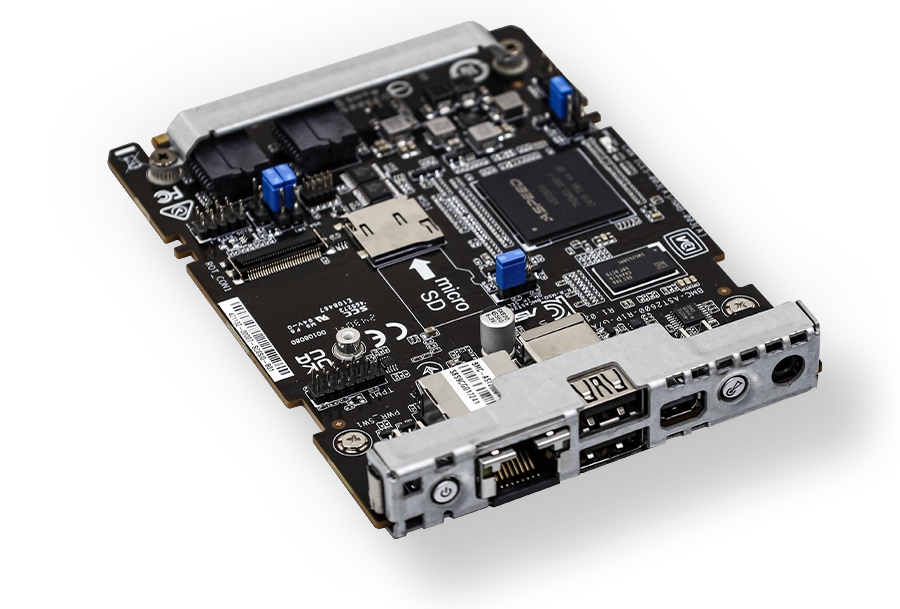
DC-SCM (Data Center Secure Control Module):
Enhances system security by providing a trusted foundation for server operations and remote management.
-
-
Toolless design for fast, simple maintenance
ASUS has redesigned the server-chassis structure for optimal airflow, without compromising on specifications, enhancing cooling efficiency. With a quick-release top cover and a streamlined airflow system, you can manage cables and components effortlessly, reducing maintenance time. This creates a seamless airflow path from front to back, efficiently dissipating heat and keeping the system running cool and stable, streamlining upkeep and minimizing downtime.
-
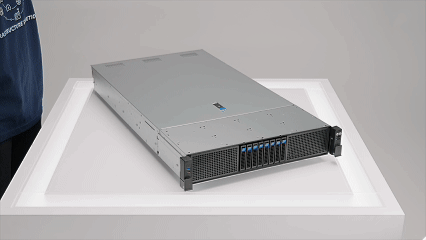
Effortless top-cover design
-
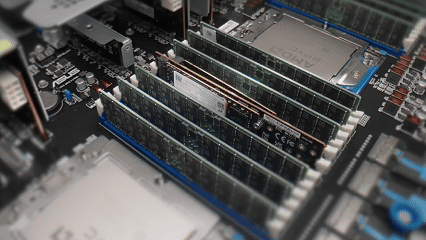
Tool-less DIMM.2 installtion
-
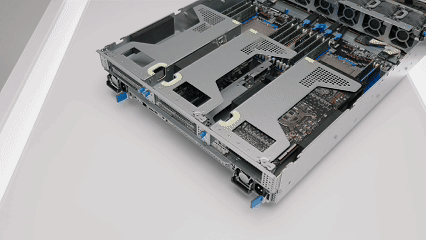
DC-SCM card
-
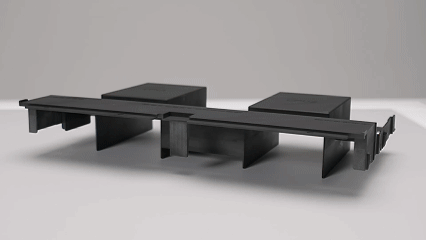
Air Duct
-
-
World Records Leadership
ASUS holds the most amount of records in dual-socket (2P) and single-socket (1P) on SPEC CPU 2017 benchmark and dominate the computing performance. These top performance results provide a useful insight into compute-intensive workloads on different computer systems, enabling our customers to reduce complexity, tackle challenging workloads and accelerate system validations.
-
ASUS servers feature Performance Boost technology to achieve the best server performance and agility by tuning servers to match the requirements of workloads, letting you gain greater control of your server environment. This technology improves workload throughput by maximizing processor frequency and boost power, ideal for timesensitive applications such as financial services or data center operations.
-

Core Optimizer
Maximizes the processor frequency in multi-core operations, avoiding frequency shifting for reduced latency.
-

Engine Boost
Automatic power acceleration with an innovative voltage design to increase server overall performance.
-

Workload Presets
Preconfigured BIOS server profiles based on workloads and benchmarks for improved performance and efficiency.
* SPEC is a corporation formed to establish and endorse standardized benchmarks and tools to evaluate performance and energy efficiency of computer systems.
-
-
ASUS select servers achieved most power efficiency positions on the SPEC Power benchmark for energy efficiency and demonstrate to customers how they can achieve faster deployments and higher energy efficiency for their IT infrastructure.
-

ASUS Power Balancer
Adjust overall loading automatically based on real-time monitoring to decrease overall power consumption for Improved efficiency and cost/performance optimization.
-

Thermal Radar 2.0
Features intelligent fan-curve adjustments to fit the real-time server usage patterns and lower fan power consumption.
-
-
-
Server-management Solution
-
Remote server management
ASUS ASMB12-iKVM is the latest server-management solution from ASUS, built upon the ASPEED 2600 chipset running on the latest AMI MegaRAC SP-X. The module provides various interfaces to enable out-of-band server management through WebGUI, Intelligent Platform Management Interface (IPMI) and Redfish® API.
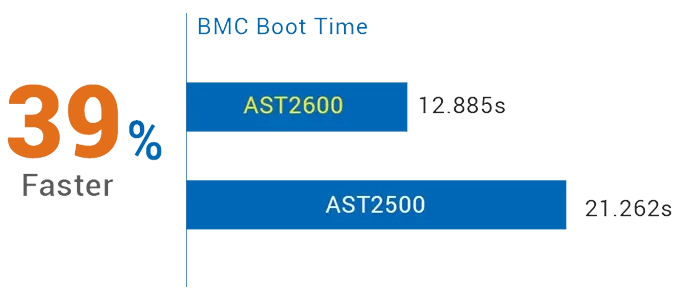
-
Streamline IT operations via a single dashboard
ASUS Control Center (ACC) is remote IT management software designed for monitoring your hardware and software IT assets and inventory status and enabling seamless remote BIOS configurations and updates, efficient IT diagnostics and troubleshooting and enhanced security with Hotfix updates, allowing easier server management for any IT infrastructure.
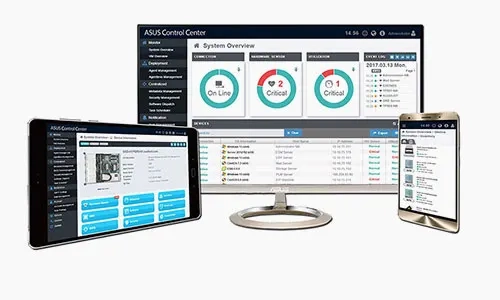
-
-
Enhanced Security
-
Hardware Root-of-Trust Solution:Detect, recover, boot and protect
ASUS servers integrate PFR FPGA as the platform Root-of-Trust solution for firmware resiliency to prevent from hackers from gaining access to infrastructure. ASUS security solutions are fully compliant with the 2018 National Institute of Standards and Technology (NIST) SP 800 193 specification.
* Platform Firmware Resilience (PFR) module must be specified at time of purchase and is factory-fitted. It is not for sale separately.
-
Trusted Platform Module 2.0
ASUS servers also include support Trusted Platform Module 2.0 (TPM 2.0) to secure hardware through integrated cryptographic keys and offer regular firmware update for vulnerabilities.
Learn more about the product support list 〉
-